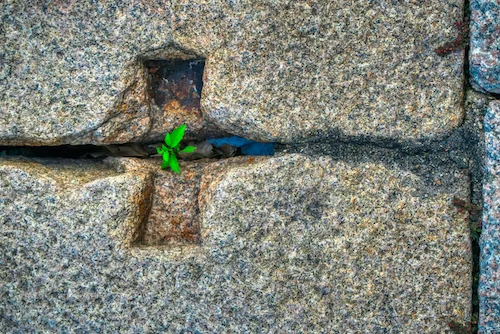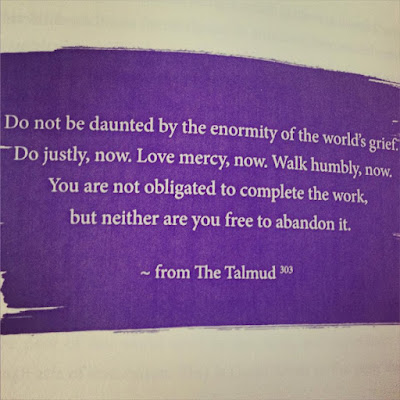PerSAVErence
Luke 18: 1-8
New Ark United Church of Christ, Newark, DE
October 16, 2022
 |
| Photo of a green shoot growing out of a crevice in a stone wall. |
Perseverance was a spelling word when I was in fifth grade, though you might not think so by the way I spelled it for the sermon title: P-E-R-S-A-V-E-R-E-N-C-E. In sixth grade, at the end of the year awards ceremony I received an award for “Perseverance in Art” because I had completed every art assignment ahead of the due date and my art teacher had to keep coming up with art projects for me to do through the end of the year. And believe me, art saved me that first year in a new school in a new town.
The dictionary defines perseverance as “the continued effort to do or achieve something despite difficulties, failure, or opposition”. Which sometimes sounds like the last thing we want to do in the midst of difficulties, failure, or opposition. Which is why Jesus is telling this parable. Just before this parable Jesus is talking about when the kingdom of God would come and how the Son of Man must endure suffering and rejection. People were losing heart, wanting to know how to make their lives more secure. Often the message we get from our culture and from church is that when we show up, we must be fully prepared, on our game, dressed for success, clear eyes, full hearts, can’t lose! So sometimes we don’t show up as much or at all because we just don’t have it. Yes, there are times when we do have to show up on our game. But not every time, all the time.
In the parable that Jesus tells about faithfulness in prayer, we have two complicated human beings. First we are introduced to a judge whose character is laid out for us: he neither fears God nor has respect for anyone. He even admits to it with no hint of remorse or obligation to change.
In our inclusive language version, we are then introduced to someone whose spouse has died but in all other translations she is a widow and a tenacious one at that. We do not know if she is rich or poor, if she is alone or has family. She is not just seeking justice but vindication, vengeance, punishment against her opponent. Not exactly an example of “love your enemy” but we can identify with her in some way in that at some point in our lives we have known what it feels like to be ignored, silenced, or judged just because of who we are.
We may also identify with that unjust judge. After all, how many of us have had our surly days at work, especially in retail or service work, only to have someone pester and harangue us into fulfilling a request. He’s not just afraid of her wearing him out—the Greek word used is better translated as he’s afraid she will come back and punch him in the eye.
Jesus uses this story as a “lesser then greater” argument. If an unjust judge, whose only fear is a slap in the face, responds to a widow, a bully whose desire for justice is next to bloodthirsty, how much more so will God who is righteous and loving respond to us showing up as we are? Jesus is imploring his listeners to pray always and to not lose heart, and yet sometimes the very reason we are praying is because we have lost heart. We want to know if God cares about our concerns and worries as much as we do.
Praying always sounds like perseverance but it also sounds exhausting, like a pretty tall order that can leave us feeling guilty, an additional burden to our neverending list of worries and things to do. David Buttrick, who was a professor of homiletics at Vanderbilt Divinity School and a former Presbyterian who joined the UCC, wrote, “The notion that, repeatedly, we must bang on the door of heaven if we are to catch God’s attention is hardly an appropriate theology of prayer.” And yet as it is written in the Talmud, we are not to be daunted by the enormity of the world’s grief. We are do justly now and love mercy now and move humbly now. We are not obligated to finish the work, but neither are we free to leave it behind.
Sometimes perseverance can look like this, an otter in a zoo hiding under a fake rock while floating down a stream of water, peeking out to see if the coast is clear, Mission: Impossible music notwithstanding.
Sometimes perseverance looks like worshiping however you’re able to make it, whenever you’re able to make it, whether it's on Facebook or Zoom in your sweatpants and slippers or here in person (you can wear your sweatpants and slippers here too, no judgment).
Sometimes perseverance looks like our tears, whether they are from grief or sadness or frustration or anger or pain, especially when they move us from where we are to a softer heart, a deeper compassion, an act of kindness or generosity no matter the size.
Sometimes perseverance looks like saying no, taking a break, setting a boundary, knowing our limits, finding our own rhythm, what works for us, and pacing ourselves. Rest is an action verb and a prayer in itself.
Sometimes perseverance looks like fits and starts, one mistake after another, embracing imperfection, leaning into the mess of life and its contradictions, and the hope is maybe the next thing will work.
Sometimes perseverance looks like getting out of bed in the morning or the afternoon, one day at a time, one step, one moment at a time.
Sometimes perseverance looks like the smallest seed that grows into a tree, the jar of yeast that’s been sitting in the back of the fridge that still has what it takes to make bread dough rise, the search for a treasure buried in a field, going after that one lost sheep, lost cause, lost friend even when you might get fleeced.
Sometimes perseverance flies in the face of everything we know and think we know. The other night, watching The Rings of Power, I heard these words: “The way of the Faithful is committing to pay the price even if the cost cannot be known and trusting that in the end it will be worth it.” And it is such extravagant faithfulness that is the very essence of hope. The kind of hope in which we do not lose heart. A perseverance that saves us.
Benediction – enfleshed.com (adapted)
Go forth in kindness, complicated, vulnerable ones,
for the Holy does not demand more than we can give.
They invite us to unlock and lift away what holds us down,
that all beings everywhere might be free.



Comments
Post a Comment